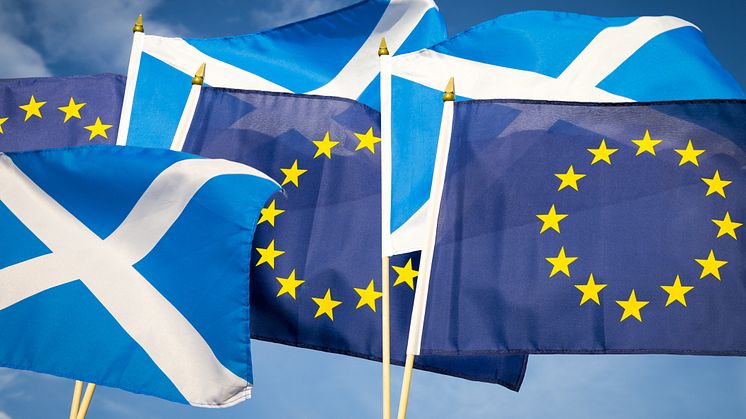
Press release -
Global Scotland in the age of Brexit
Scotland is a country which has been shaped by migration – with Scots emigrating from their homeland to make their mark on the rest of the world and embracing the cultures and influences of immigrants arriving in Scotland.
Scottish attitudes to the European Union are different to the rest of the UK, as demonstrated during the 2016 EU referendum, in which the population of Scotland voted to remain.
With Brexit now looming, Northumbria University’s Professor Tanja Bueltmann will explore Scotland’s past and future as a global nation in her lecture Global Scotland in the Age of Brexit: Historical perspectives on the Scottish diaspora and migration.
The lecture is the third in a series organised by the University of Dundee’s Centre for Scottish Culture, in partnership with History Scotland magazine.
As a historian of migration and diaspora and a global authority on Scotland's worldwide diaspora, Professor Bueltmann will discuss what Scotland’s past can tell us about current political developments.
As she explains: “Scots have been ‘citizens of the world’ for centuries, with global Scots settling in diverse countries and building diaspora communities around the world. These communities were connected to the homeland, contributing to both outward and inward migration flows being seen as a normal part of Scottish life.
“Brexit jeopardises this connected ‘Scottish world’ – not by Scotland’s choice, but by political developments largely outside the nation’s control. This lecture examines what this means for Scotland in the age of Brexit in historical context.”
The Scots have a long history of emigrating to other parts of the world. Early movements saw Scottish traders establish bases in London and outside of the British and Irish Isles, for instance in the Low Countries, while the Union of 1707 meant that Scots could make use of the opportunities the British Empire offered further afield.
During the 19th century age of mass migration Scots emigrated to diverse locations round the world. In New Zealand, for example, they made up about 25% of British migrants –double their population share in the UK at the time.
The extent of this emigration explains in part the impact Scots have had around the world, for instance in early colonial government and education. Scots were internationally well connected through kinship networks, associations, and improving communication methods.
News of their exploits also travelled home back to Scotland, which contributed to the Scots’ understanding of themselves as a very global people, even in the 19th century.
At the same time Scotland has also long since been a destination for migrants and they too have played a large part in shaping Scotland.
Professor Bueltmann added: “The historical understanding of Scotland as a global nation, that has run through much of its history, and the appreciation of the positive contribution of migration, provides important context to Scotland’s very different view of the European project and also reactions to Brexit.
“The Scottish government has been doing all it can, within the means it has as a devolved power, to keep Scotland open and welcoming. While some English MPs seek to re-invigorate the Empire and past glories, Scotland’s politicians have tended to be future-oriented by trying to positively place Scotland as part of a community of nations.”
The History Scotland Lectures travel around Scotland, giving people across the country the chance to learn more about their history.
History Scotland's consultant editor Dr Allan Kennedy, a lecturer in history at Dundee University, said: “We are delighted to be hosting Tanja Bueltmann for this important and timely lecture.
“Professor Bueltmann’s expertise gives her unique insights into the significance of Brexit for Scots, both at home and overseas. We would warmly invite anybody with an interest in Scotland’s past and future as a global nation to join us for what promises to be a fascinating, thought-provoking evening.”
Global Scotland in the age of Brexit takes place at Dundee University, from 6pm on Thursday 11 April. The event is free and open to all, although anyone interested in attending is asked to reserve their place by emailing editorial@historyscotland.com or calling 0113 200 2922.
More information about the History Scotland Lectures is available at https://www.historyscotland.com/information/history-scotland-lectures
Find out more about Northumbria University’s Department of Humanities.
Topics
Northumbria is a research-rich, business-focused, professional university with a global reputation for academic excellence. To find out more about our courses go to www.northumbria.ac.uk
If you have a media enquiry please contact our Media and Communications team at media.communications@northumbria.ac.uk or call 0191 227 4604.






